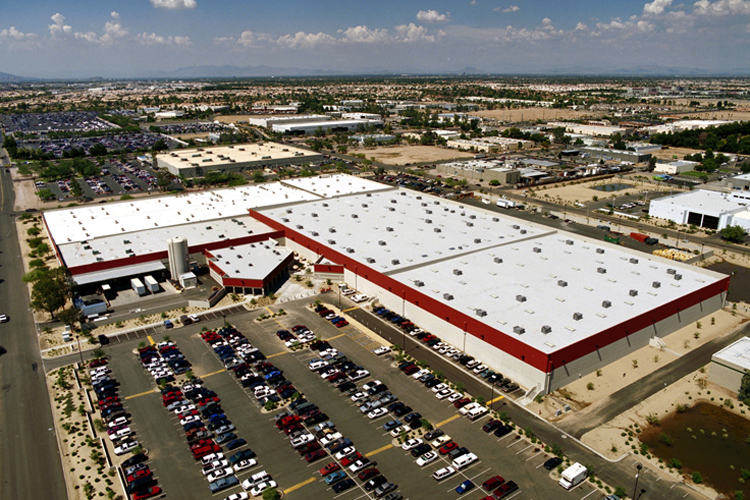One of the largest “free trade” zone designations in Arizona has been issued for a distribution center in Chandler operated by Phoenix-based Avnet, a technology solutions company with millions of customers worldwide.
Avnet announced this month that its McKemy Distribution Center secured a Foreign-Trade Zone (FTZ) authorization from the United States Bureau of Customs and Border Protection. The designation, also known as a “free trade zone,” was created almost a century ago to help American businesses compete globally.
Avnet – one of the world’s largest distributors of electronic components and embedded solutions – will reap benefits from the new designation like increased logistics efficiency, improved cash flow and happier customers, company executives said.
“Avnet is focused on mitigating risk, minimizing costs, and avoiding supply chain disruptions that can pose significant challenges for our customers amid complex and changing international trade regulations,” said Vincent Cellard, vice president of operations and supply chain at Avnet. “Securing FTZ status for McKemy, our largest distribution center in the United States, better enables Avnet to navigate these conditions for our global customers.”
Under the designation, Avnet can import products into the U.S. and store them without incurring a duty tax, delaying payment of tariffs until products leave the zone for destinations inside the U.S. Products also can transit through the facility to overseas destinations without incurring the same duties and tariffs as those entering the U.S.
With more than 2 million customers in 125 countries, the new designation will allow Avnet to remain “agile” in the face of regulatory changes, Cellard said.
“We’re focused on reducing time to market for our customers, and leveraging the McKemy Distribution Center as an FTZ further improves efficiencies in our distribution network,” he said.
FTZs designed to increase global competitiveness
As the U.S. imposes tariffs on imports from trading partners like China, the zones give Arizona importers and manufacturers an opportunity to alleviate some of these added costs. Products can be purchased duty-free into an FTZ for the purpose of storing, repacking, display, assembly and manufacturing.
FTZs were originally created in 1934, in part to mitigate the destructive impacts of the Smoot-Hawley Tariffs of 1930 that set into place protectionist trade policies. The excessively high tariffs were seen as a contributing factor to the Great Depression.
Arizona offers advantages for businesses in the zone
FTZs have been granted to many companies across Arizona including Orbital Sciences Corporation, Isola USA corporation. Abbott Laboratories, SUMCO Southwest Corporation, Microchip Technology, Inc., and Honeywell Aerospace, Inc.
To attract and retain industry in the state, Arizona provides a substantial reduction on property taxes for companies qualifying for the federal FTZ or sub-zone designation.
Businesses and facilities located in a zone are eligible for up to a 72.9 percent reduction in state real and personal property taxes. State law allows for any property in a zone to be reclassified from 18 percent to 5 percent valuation.
Foreign trade zones boost local economies
Today, the National Association of Foreign-Trade Zones reports that FTZs generate billions of additional dollars into the economy, add direct and indirect jobs including more production jobs in the U.S.
For example, the 2018 annual FTZ Board report to Congress states that BMW manufacturing operations in South Carolina in FTZs directly and indirectly add $6.3 billion annually to the state’s economy and lead to the employment of 36,285 residents. Another company, eBike manufacturer Prodeco Technologies in Florida, uses its FTZ duty savings to keep its finished bike prices competitive with foreign-assembled bikes.
Top importers in U.S. operate with FTZs
Approximately half of the top 100 importers in the U.S. operate with FTZs. Most are in Texas (32), followed by Florida (21) and New York (15). Over 450,000 persons were employed at some 3,200 firms that used FTZs during 2018, according to the report.
The value of shipments into FTZs totaled over $669 billion, compared with over $610 billion in 2017. About 63 percent of the shipments received at zones involved domestic status merchandise. Exports amounted to $87 billion.
Higher security, lower costs, competitive edge
The Foreign Trade Zone Act was created to:
• Facilitate and expedite international trade
• Provide special customs procedures to help firms compete with foreign plants
• Attract offshore activity and encourage retention of domestic activity
• Assist state and local economic development efforts
• Increase security to the highest level
• Create employment opportunities
This story was originally published at Chamber Business News.




